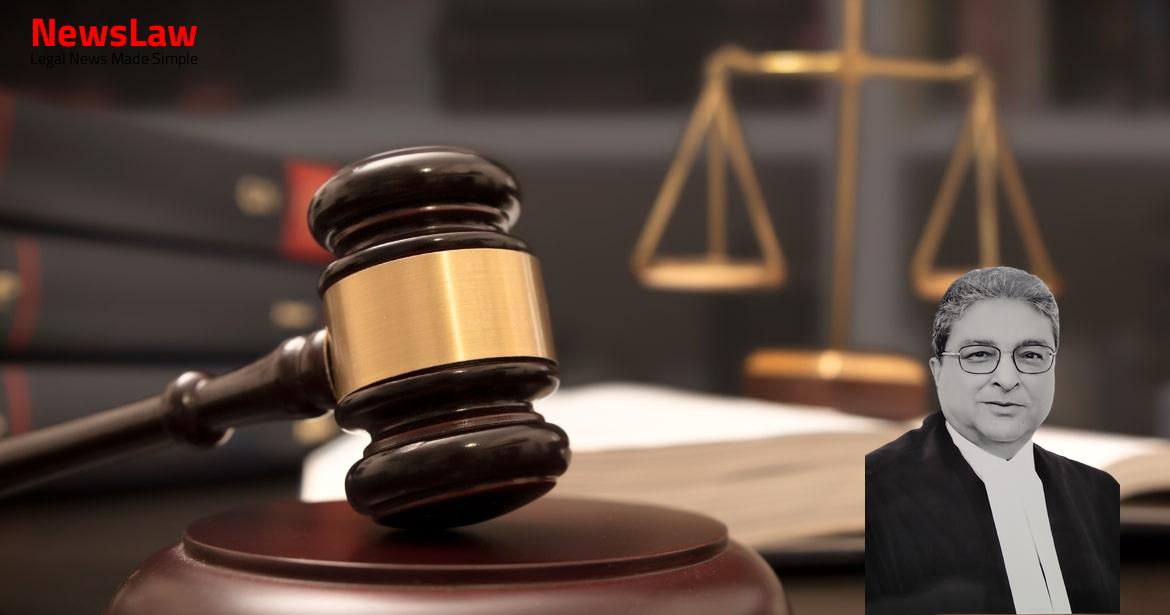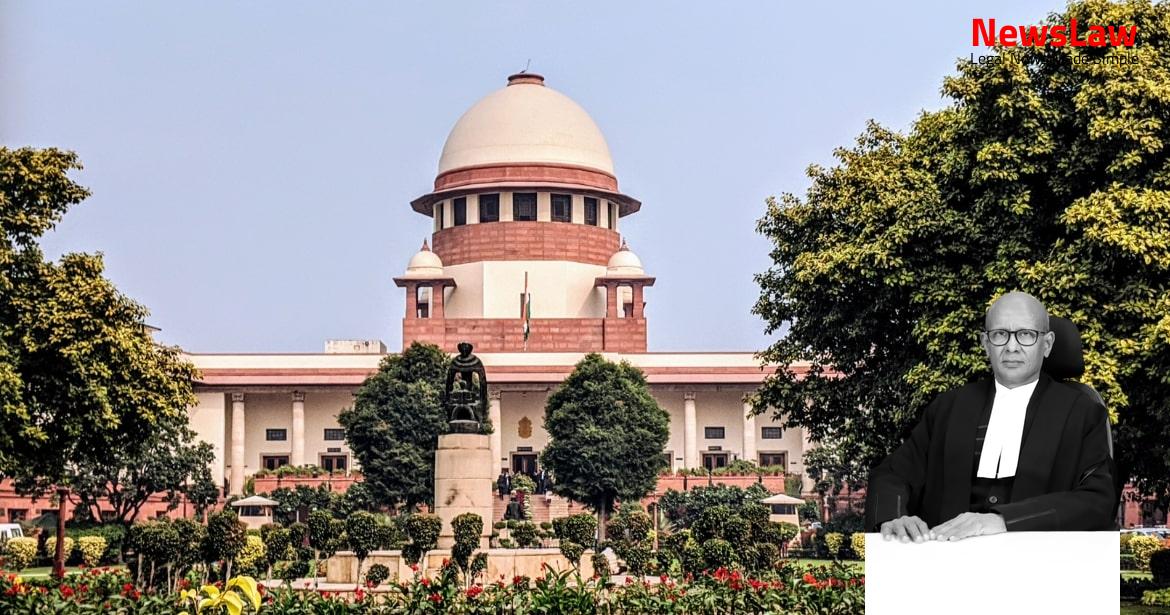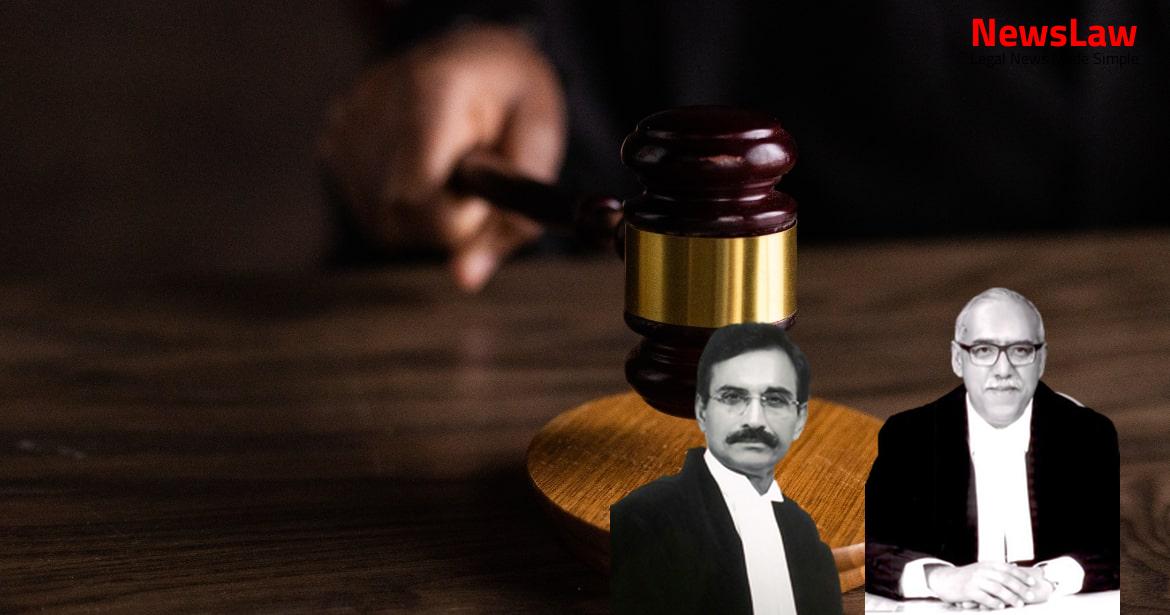In a significant legal case, the Supreme Court of India recently delivered a crucial judgment on the dispute over Section 80 CPC compliance. The case involved intricate arguments between the parties, ultimately leading to this landmark decision. Stay tuned to unravel the details and implications of this ruling! #SupremeCourt #Section80CPC #LegalBattle
Facts
- Appellant filed a Writ Petition due to arbitrary part-termination of contract and calling for fresh tender without notice.
- Writ Petition was dismissed on 24.12.1999, prompting the appellant to file a Writ Appeal.
- Appellant challenges the partial termination of the contract and lists payments due amounting to Rs.88.06 lakhs.
- Superintending Engineer partially terminated the contract on 16.12.1999 citing lack of progress by the appellant.
- Writ Appeal was dismissed, and arbitration was not an option for claims above Rs.2 lakhs.
- Original contract period of 18 months was extended to 30.03.2000 due to delays by the Department.
- Despite the extension, the contract was partially terminated on 16.12.1999 before it expired.
- Appellant filed O.S. No. 2/2002 on 12.09.2002 in the Court of the Special Judge at Virudhunagar.
- Plaintiff-appellant filed a Writ Petition in Madras High Court which was rejected, stating an alternative remedy existed in filing a Civil Suit.
- An appeal against the rejection met the same fate with an order stating an adequate alternative remedy existed in arbitration.
- Appellant sent a legal notice dated 14.01.2000, stating completion of work despite delays in approvals.
- High Court found notices sent under Section 80 CPC lacked ‘full particulars’ as mandated, leading to the appeal being allowed on preliminary grounds.
- Appellant prayed for declaration of the partial termination order dated 16.12.1999 as illegal and void, seeking a sum of Rs.3.30 crores with interest.
- Additional District Judge found substantial compliance of Section 80 CPC due to notice sent to three authorities and clarity of cause of action and reliefs claimed.
- Appellant was awarded Rs.87,01,200/- with interest at 6% per annum, dissatisfying both the appellant and the State who filed appeals.
Also Read: Judgment on Contract Dispute: PSA Mumbai Investments PTE. Ltd. v. Jawaharlal Nehru Port Trust
Arguments
- Learned counsel for the appellant argued substantial compliance with section 80 CPC was made as determined by the Additional District Judge.
- The High Court erred in not recognizing this substantial compliance and treated section 80 as inflexible.
- Counsel for the State contended no notice was issued under Section 80 CPC as the letters did not explicitly mention Section 80 CPC.
- Counsel argued that the notices were issued before the disposal of the Writ Appeal, and cited judgments stating that as long as the State was properly notified and the cause of action was communicated, it is sufficient compliance.
- The 1976 amendment added section 80(3) clarifying the communication requirements for notices to the Government.
- It was noted that the purpose of the notice, for the Government to settle claims, could not be achieved when the claims are sub judice.
- None of the notices were issued after the Writ Appeal was dismissed
- Notices would have qualified as such only before filing the present Suit
Also Read: Landmark Judgment: Abhyudaya Co-operative Bank Ltd. vs. Guravs
Analysis
- Section 80 of the Code of Civil Procedure (CPC) and its amendments were discussed in detail.
- The Amendment Act of 1976 renumbered Section 80 and added subsections (2) and (3) with effect from February 1, 1977.
- The Law Commission recommended the deletion of Section 80 in multiple reports, citing hardships in cases requiring urgent relief against the Government.
- Although recommended, Section 80 was retained with modifications as per the Joint Committee of Parliament’s suggestion.
- Subsection (2) allowed for urgent relief against the Government with court permission.
- Non-compliance with Section 80 notice was common, leading to technical defences by the Government in many cases.
- The court emphasized substantial compliance with the requirements of Section 80 in allowing claims beyond the initial notice.
- The timing of the notice and subsequent actions by the parties were key factors in determining the validity of claims.
- Despite the technical plea raised in some cases, courts noted the importance of substantial compliance and disregarded technical defenses.
- The Law Commission’s recommendations on Section 80 over the years were referenced to highlight the ongoing discussions around its relevance and implications.
- Sub-section (2) of Section 80 CPC allows a person to institute a suit without serving notice under sub-section (1) if the suit is for urgent and immediate relief against the Government or a public officer.
- The Court must give the Government or public officer a reasonable opportunity to show cause before granting relief.
- If the Court determines that no urgent relief is needed, it shall return the plaint for presentation after complying with the requirements of sub-section (1).
- Sub-section (3) seeks to relax the rigour of sub-section (1) by allowing for substantial compliance.
- Section 80 of the Civil Procedure Code imposes a statutory and unqualified obligation on the courts.
- Strict compliance with Section 80 is necessary for maintaining a suit against the Government or a public officer.
- The purpose of Section 80 is to advance justice and avoid unnecessary litigation.
- Common sense should be applied when interpreting and implementing Section 80.
- The notice under Section 80 serves the purpose of giving the Government a chance to settle claims outside of court.
- The legislative intent behind Section 80 is to secure public good by avoiding litigation.
- The learned Additional District Judge’s judgment was considered correct.
- The notice sent on 14.01.2000 was under Section 80 CPC in case the Writ Appeal failed and a Suit needed to be filed.
Also Read: Supreme Court Judgment: Review Petition in RPC Aspect Case
Decision
- The High Court was requested to remit the matter and dispose of the two appeals on merits
- The Suit dates back to the year 2002
- Urging the High Court to expedite the process and dispose of the appeals at the earliest
Case Title: Y. SAVARIMUTHU Vs. THE STATE OF TAMIL NADU .
Case Number: C.A. No.-004495-004496 / 2019



